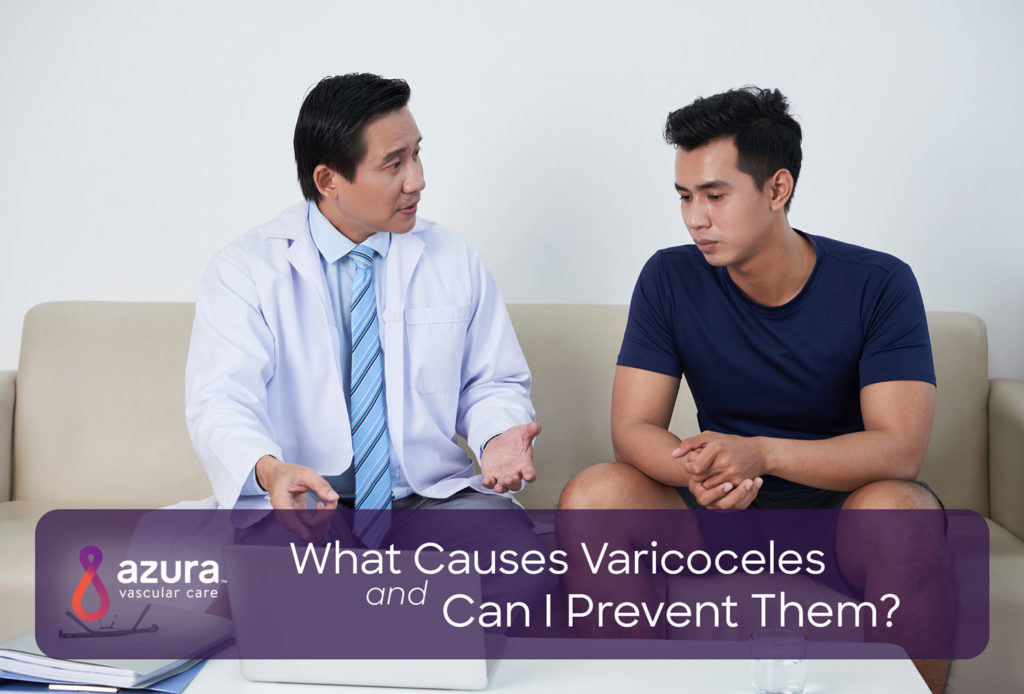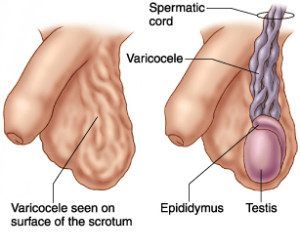
Varicoceles are a male health condition that affects the testicular veins. A varicocele can cause pain and discomfort and lead to problems with decreased sperm count and fertility when left untreated. (i) Knowing more about the causes of varicocele and prevention methods can help you maintain good overall health and avoid possible complications associated with this male health problem.
What Are Varicoceles?
 Varicoceles are large, swollen veins that develop inside the testicles. These veins are similar to varicose veins that can develop in the legs. (ii)
Varicoceles are large, swollen veins that develop inside the testicles. These veins are similar to varicose veins that can develop in the legs. (ii)
Varicoceles don’t always produce symptoms but can grow larger and become more noticeable as time passes. (ii) In some instances, varicoceles may cause testicular pain and swelling that gets worse throughout the day. Varicocele symptoms may include pain that ranges between dull and sharp in intensity, pain that increases with standing for long periods of time, and pain that is only relieved when lying on your back.
What Causes Varicoceles?
Varicoceles develop when the valves inside the veins stop working properly and fail to direct blood out of the testicles and back towards the heart. Improper blood flow through these veins can cause blood to pool and flow backward into the veins to result in swelling and enlargement.
An estimated 15 out of 100 men suffer from varicoceles. (iii) There are no significant risk factors or other varicocele causes, and no known associations with race, ethnicity, place of birth, or defects. Varicoceles often develop during puberty and are more common in males between the ages of 15 and 25. (i) Varicoceles that suddenly develop in older men may be caused by a kidney tumor, which can interfere with blood flow to veins in the testicles.
What Problems Are Linked to Varicoceles?
Varicocele-related infertility is one of the most serious complications of this male health condition but only affects two in every 10 men with varicoceles. (iii) Varicoceles can interfere with the temperature in or around the testicles, affecting sperm development and motility.
Varicoceles may also cause testicle shrinkage or atrophy. The malfunctioning valves in varicoceles that result in the pooling of blood can lead to the buildup of toxins in the blood that damage the testicles and cause shrinkage. (ii) Other potential complications of varicoceles include the formation of blood clots and infection. (i)
How Can Varicoceles Be Prevented?
There are currently no medications that can treat or prevent varicoceles. (iii) There are also no known risk factors for varicoceles that can help you identify whether you may be at risk for this male health condition. However, you may be able to prevent varicoceles by improving and maintaining the health of your veins.
Exercise Regularly
Physical activity promotes healthy blood flow and circulation and has a positive effect on vein and artery health. (iv) Start exercising regularly to keep your heart and veins healthy. Adults should aim for at least 150 minutes of moderately intense exercise every week, whereas children and teens between the ages of 6 and 17 should aim for at least 60 minutes of moderate-to-vigorous activity every day. Moderately intense exercises include swimming, brisk walking, and yard work. (v)
Eat Healthy Foods
Fruits, vegetables, leafy greens, fish, poultry, and nuts are examples of healthy, whole foods that contribute to improved heart health and circulation. For instance, fish, nuts, and avocados are high in omega-3 fatty acids that may help reduce inflammation caused by damaged blood vessels. (vi) Eat plenty of nutritious foods such as these, and stay away from foods high in processed sugars, saturated fats, and sodium—all of which may worsen vein health. (vii)
Drink Plenty of Water
Staying hydrated can help prevent your blood from thickening and causing problems with circulation. Drink plenty of water throughout the day to help flush toxins from the body and to combat circulation issues. The recommended daily fluid intake for men is about 15.5 cups. (viii)
Stop Smoking
Smoking can damage the structure and function of blood vessels and lead to plaque buildup in veins and arteries. If you smoke, quit smoking as soon as possible to improve and maintain your vascular health and reduce the risk for blood clots. (ix)
What Treatments Are Available for Varicoceles?
If you have a sore testicle or other symptoms of varicoceles, a vascular specialist can perform an exam and diagnose your condition. Your vascular specialist may order an ultrasound to confirm a varicocele diagnosis if you are not exhibiting physical signs and symptoms such as lumps and swelling in the groin. (i)
Varicoceles can be treated using surgery or embolization. In open or laparoscopic surgery, a vascular surgeon makes an incision in your abdomen or groin to identify and tie off the distended vein. This prevents blood from pooling in those distended veins and . Surgery comes with potential risks including artery damage, infection, and recurrence of varicocele.
Varicocele embolization, performed by an interventional radiologist (IR), offers less downtime and a faster recovery than surgery and can be performed as a minimally invasive procedure on an outpatient basis. During varicocele embolization, an IR – vascular specialist- uses image-guided technology to insert a catheter into the abnormal vein. A sclerosing agent or coils are then inserted through the catheter to block, or embolize the vein and redirect blood flow through other veins. (x) Varicocele embolization offers minimal downtime of two days and allows you to resume your exercise routine after seven to 10 days. (x)
Azura Vascular Care is devoted to helping you understand your varicocele diagnosis and will work with you on exploring your non-surgical varicocele treatment options. Call 866-705-8346 to schedule an appointment with a vascular specialist today.
Sources:
(i) Medline Plus. (2017, August 26). Varicocele. Retrieved February 27, 2019, from https://medlineplus.gov/ency/article/001284.htm.
(ii) Mayo Clinic. (2017, December 27). Varicocele: Symptoms & causes. Retrieved February 27, 2019, from https://www.mayoclinic.org/diseases-conditions/varicocele/symptoms-causes/syc-20378771.
(iii) Urology Care Foundation. (n.d.). What are varicoceles? Retrieved February 27, 2019, from http://www.urologyhealth.org/urologic-conditions/varicoceles/printable-version.
(iv) Harvard Health Publishing. (2006, June). Exercise and your arteries. Retrieved February 27, 2019, from https://www.health.harvard.edu/newsletter_article/Exercise_and_your_arteries.
(v) U.S. Department of Health and Human Services. (2018). Physical activity guidelines for Americans: 2nd edition. Retrieved February 27, 2019, from https://health.gov/paguidelines/second-edition/pdf/Physical_Activity_Guidelines_2nd_edition.pdf#page=55.
(vi) Mayo Clinic. (2019, January 9). Omega-3 in fish: How eating fish helps your heart. Retrieved February 27, 2019, from https://www.mayoclinic.org/diseases-conditions/heart-disease/in-depth/omega-3/art-20045614.
(vii) Centers for Disease Control and Prevention. (2018, March 26). Brain health is connected to heart health. Retrieved February 27, 2019, from https://www.cdc.gov/features/heart-brain-health/index.html.
(viii) Mayo Clinic. (2017, September 6). Water: How much should you drink every day? Retrieved February 27, 2019, from https://www.mayoclinic.org/healthy-lifestyle/nutrition-and-healthy-eating/in-depth/water/art-20044256.
(ix) National Heart, Lung, and Blood Institute. (n.d.). Smoking and your heart. Retrieved February 27, 2019, from https://www.nhlbi.nih.gov/health-topics/smoking-and-your-heart.
(x) Mayo Clinic. (2017, December 27). Varicocele: Diagnosis & treatment. Retrieved February 27, 2019, from https://www.mayoclinic.org/diseases-conditions/varicocele/diagnosis-treatment/drc-20378772.